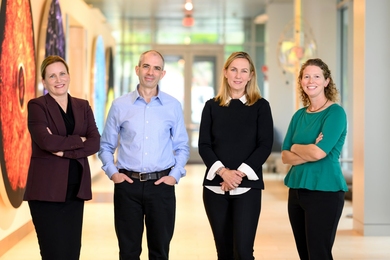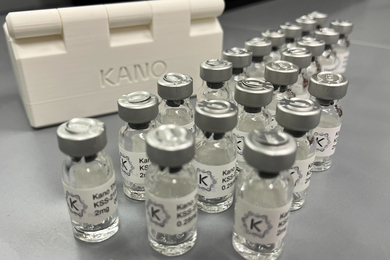JoAnne Stubbe, a biochemist whose work over the past four decades has had profound impacts on fields ranging from cancer drug development to synthesis of biodegradable plastics, is MIT’s James R. Killian Jr. Faculty Achievement Award winner for 2011-12.
The award was announced at the faculty meeting on Wednesday, May 18. Established in 1971 as a tribute to MIT's 10th president, the Killian Award recognizes extraordinary professional accomplishment by an MIT faculty member. The winner is asked to deliver a lecture in the spring term.
Stubbe, the Novartis Professor of Chemistry and Biology, has spent most of her career studying enzymes involved in nucleotide metabolism, which is central to the synthesis of DNA and RNA. Her success in unraveling the specific steps in enzymatic reactions has had profound impacts on a wide variety of fields.
Susan Silbey, professor of anthropology and chair of the Killian Award Selection Committee, read the award citation, which described Stubbe as the “quintessential MIT faculty member.”
“In all aspects of her research and teaching, her approach is packed with energy and meticulous in the attention to detail with uncompromising standards,” the citation read. “Her tour-de-force discoveries are the result of elegant experimental design, deep chemical and biological insight, and a remarkable degree of focus and effort, fueled by her scientific curiosity and desire to decipher nature’s secrets.”
Stubbe’s most noted work, for which she was awarded the National Medal of Science in 2009, involves a class of enzymes that play an essential role in DNA replication and repair. She discovered how these enzymes, called ribonucleotide reductases, use free-radical chemistry to convert RNA building blocks (nucleotides) to DNA building blocks (deoxynucleotides), a process essential to making and repairing DNA.
Her detailing of this nucleotide reduction process has led to the design of mechanism-based inhibitors; one of these is the drug gemcitabine, used clinically in the treatment of advanced pancreatic cancer and certain lung carcinomas.
“I am thrilled to receive the Killian Award and am grateful to the Institute for providing an environment full of passionate, interactive students and faculty, where your dreams can come true,” Stubbe said Wednesday.
Stubbe also discovered the structure and function of bleomycin, an antibiotic used as a cancer drug. Her research team, in collaboration with John Kozarich’s laboratory at the ActivX biopharmaceuticals company, revealed how bleomycin damages DNA, killing cancer cells. They also identified the structure of the DNA damage.
Stubbe is a member of the National Academy of Sciences, the American Academy of Arts and Sciences and the American Philosophical Society. She was the first woman to receive the Welch Award in Chemistry (2010), and has also won the Franklin Medal in Chemistry (2010), the Nakanishi Award (2009), the Prelog Medal (2009), the Kaiser Award (2008), the National Academy of Sciences Award in Chemical Sciences (2008), the Repligan Award (2004), the Alfred Bader Award in Bioorganic and Bioinorganic Chemistry (1997), the Cope Scholar Award (1993) and the Pfizer Award in Enzyme Chemistry (1986), among others.
She earned a bachelor's degree in chemistry in 1968 from the University of Pennsylvania and a PhD in organic chemistry in 1971 from the University of California at Berkeley.
Stubbe joined the MIT faculty in 1987 from the University of Wisconsin at Madison, where she had been a faculty member since 1983. She has also taught at the Yale University School of Medicine (1977-80) and at Williams College (1972-77), and was an NIH postdoctoral fellow at Brandeis University (1975-77) as well as a postdoc at UC Berkeley (1971-72).
The award was announced at the faculty meeting on Wednesday, May 18. Established in 1971 as a tribute to MIT's 10th president, the Killian Award recognizes extraordinary professional accomplishment by an MIT faculty member. The winner is asked to deliver a lecture in the spring term.
Stubbe, the Novartis Professor of Chemistry and Biology, has spent most of her career studying enzymes involved in nucleotide metabolism, which is central to the synthesis of DNA and RNA. Her success in unraveling the specific steps in enzymatic reactions has had profound impacts on a wide variety of fields.
Susan Silbey, professor of anthropology and chair of the Killian Award Selection Committee, read the award citation, which described Stubbe as the “quintessential MIT faculty member.”
“In all aspects of her research and teaching, her approach is packed with energy and meticulous in the attention to detail with uncompromising standards,” the citation read. “Her tour-de-force discoveries are the result of elegant experimental design, deep chemical and biological insight, and a remarkable degree of focus and effort, fueled by her scientific curiosity and desire to decipher nature’s secrets.”
Stubbe’s most noted work, for which she was awarded the National Medal of Science in 2009, involves a class of enzymes that play an essential role in DNA replication and repair. She discovered how these enzymes, called ribonucleotide reductases, use free-radical chemistry to convert RNA building blocks (nucleotides) to DNA building blocks (deoxynucleotides), a process essential to making and repairing DNA.
Her detailing of this nucleotide reduction process has led to the design of mechanism-based inhibitors; one of these is the drug gemcitabine, used clinically in the treatment of advanced pancreatic cancer and certain lung carcinomas.
“I am thrilled to receive the Killian Award and am grateful to the Institute for providing an environment full of passionate, interactive students and faculty, where your dreams can come true,” Stubbe said Wednesday.
Stubbe also discovered the structure and function of bleomycin, an antibiotic used as a cancer drug. Her research team, in collaboration with John Kozarich’s laboratory at the ActivX biopharmaceuticals company, revealed how bleomycin damages DNA, killing cancer cells. They also identified the structure of the DNA damage.
Stubbe is a member of the National Academy of Sciences, the American Academy of Arts and Sciences and the American Philosophical Society. She was the first woman to receive the Welch Award in Chemistry (2010), and has also won the Franklin Medal in Chemistry (2010), the Nakanishi Award (2009), the Prelog Medal (2009), the Kaiser Award (2008), the National Academy of Sciences Award in Chemical Sciences (2008), the Repligan Award (2004), the Alfred Bader Award in Bioorganic and Bioinorganic Chemistry (1997), the Cope Scholar Award (1993) and the Pfizer Award in Enzyme Chemistry (1986), among others.
She earned a bachelor's degree in chemistry in 1968 from the University of Pennsylvania and a PhD in organic chemistry in 1971 from the University of California at Berkeley.
Stubbe joined the MIT faculty in 1987 from the University of Wisconsin at Madison, where she had been a faculty member since 1983. She has also taught at the Yale University School of Medicine (1977-80) and at Williams College (1972-77), and was an NIH postdoctoral fellow at Brandeis University (1975-77) as well as a postdoc at UC Berkeley (1971-72).






